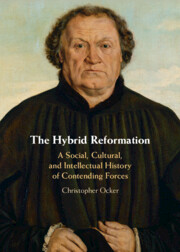
-
Select format
-
- Publisher:
- Cambridge University Press
- Publication date:
- September 2022
- September 2022
- ISBN:
- 9781108775434
- 9781108477970
- Dimensions:
- (254 x 178 mm)
- Weight & Pages:
- 0.8kg, 326 Pages
- Dimensions:
- Weight & Pages:
You may already have access via personal or institutional login
Book description
Three basic forces dominated sixteenth-century religious life. Two polarized groups, Protestant and Catholic reformers, were shaped by theological debates, over the nature of the church, salvation, prayer, and other issues. These debates articulated critical, group-defining oppositions. Bystanders to the Catholic-Protestant competition were a third force. Their reactions to reformers were violent, opportunistic, hesitant, ambiguous, or serendipitous, much the way social historians have described common people in the Reformation for the last fifty years. But in an ecology of three forces, hesitations and compromises were natural, not just among ordinary people, but also, if more subtly, among reformers and theologians. In this volume, Christopher Ocker offers a constructive and nuanced alternative to the received understanding of the Reformation. Combining the methods of intellectual, cultural, and social history, his book demonstrates how the Reformation became a hybrid movement produced by a binary of Catholic and Protestant self-definitions, by bystanders to religious debate, and by the hesitations and compromises made by all three groups during the religious controversy.
Reviews
‘The nine chapters that form the body of this book should not be read as a comprehensive guide to the hybrid Reformation, but as a series of forays intended to help historians discern third forces amid the noise and tumult of confrontational polemics … Ocker’s concluding essay offers a splendid guide to the conceptual underpinnings of hybridity, the historiography of ambiguity and precarity, and the poverty of interpretive paradigms, such as confessionalization theory, that fail to account for it.’
David M. Luebke Source: Journal of Modern History
Contents
Metrics
Altmetric attention score
Full text views
Full text views help Loading metrics...
Loading metrics...
* Views captured on Cambridge Core between #date#. This data will be updated every 24 hours.
Usage data cannot currently be displayed.
Accessibility standard: Unknown
Why this information is here
This section outlines the accessibility features of this content - including support for screen readers, full keyboard navigation and high-contrast display options. This may not be relevant for you.
Accessibility Information
Accessibility compliance for the PDF of this book is currently unknown and may be updated in the future.


